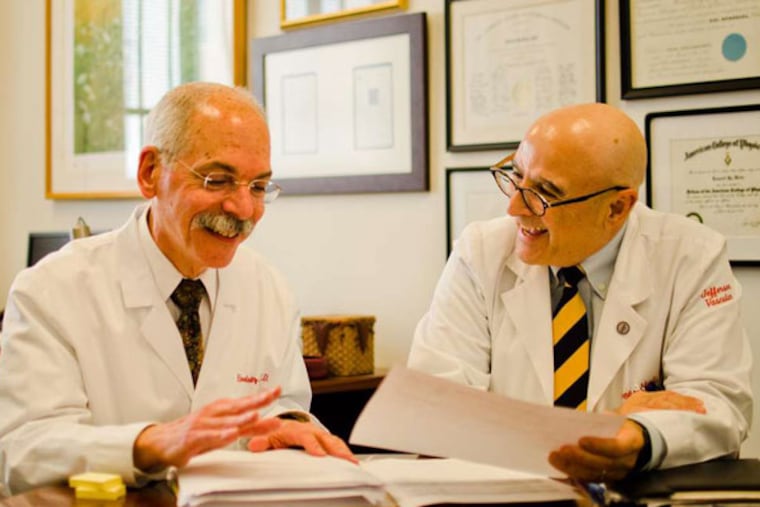Their advice has a side effect - laughter
'Consult Guys' videos help fellow doctors with real situations.

Geno Merli figures it's about 10 or 15 minutes into the conventional medical school lecture when the cellphones and iPads come out and the texting and Web-surfing start.
"They're doing something else while they're listening," says Merli, an internist and codirector of the Vascular Center at Thomas Jefferson University Hospital.
It's not that different at medical conventions, he says, which was why the people who run the annual American College of Physicians (ACP) meeting came to Merli and fellow lecturer Howard Weitz seven years ago and said, almost pleadingly, "Be innovative. Try something new."
The result, perhaps not new but certainly innovative by medical-society standards, was "The Consult Guys" (http://annals.org/consultguys), a routine modeled on the old National Public Radio show Car Talk.
Weitz, a Jefferson cardiologist, and Merli were huge fans of the show, which convulsed listeners for 35 years before it closed in 2012. "We thought if we could adapt it to physicians' education, it would be a real winner or a total loss," says Weitz. "But the need was there."
The routine, medical terminology spiced with banter, would be presented live at conventions or in video form.
There would be some key differences, of course. Atrial fibrillation and aortic stenosis - two Consult Guys subjects - have fewer comic possibilities than a driver's near-neurotic attachment to an aged Ford Pinto. And - up to now at least - there's no way for the audience to call in.
But the segments, each built around a real or simulated doctor-patient interaction, are designed to deal with serious issues: How do you find the right treatment for the patient, using research and consultation with colleagues? How do you keep the care patient-centered?
And, perhaps most important, what's the best way for today's physicians to keep up with the medical information explosion?
"We try to get the focus in seven or eight minutes," says Weitz. "They know they can get a key clinical pearl with full discussion in less than eight minutes." He estimates that about 40 percent of the cases are real, with identifying patient information changed. The rest are fictional or composites.
The show has proved popular with physicians since it went viral - so to speak - on the website of the Annals of Internal Medicine, the previously more conservative journal of the Philadelphia-based ACP.
Of the 167 videos on the journal's website, the nine most viewed are by the Consult Guys. Since launching on the site last September, they have generated more than 57,000 page views.
Each video segment also includes a quiz for physicians, who can get continuing education credits for successfully completing them. "We did it as a test balloon to see if people were going to say it was ridiculous or that it was cheapening the journal or that it wasn't scholarly enough," says Annals editor Christine Laine. "But the feedback we've gotten has been overwhelmingly positive. Annals is kind of a somber, serious publication. That's one of our strengths and probably one of our weaknesses."
The Annals has tried other experiments such as an article on patient safety done in graphic novel form. "Young physicians these days are visual learners," says Laine, "growing up with YouTube and other media."
Darren B. Taichman, the Annals' deputy executive editor and a 1993 Penn medical school graduate, recalls his own student days when people carried around large books or pockets full of notes. "Now the only thing they're carrying is a PDA," he says.
In the 21st century, he adds, the emphasis for physicians is not just what they know about a topic but about where to find the latest information on it.
"Are they carrying less in their heads?" Taichman asks. "I don't know. Perhaps they don't need to carry as much as long as they can find the information."
At the same time, Laine says, Consult Guys "is traditional. Doctors learn from other doctors and most education is informal.
"Geno and Howard are really smart colleagues. They're the people you ask when you have a patient and you don't know what's going on."
In the future, Taichman says, "we'd like to make it more interactive. To have other physicians phoning in."
Weitz and Merli say they'd like that, too, although they have gotten topic ideas from as far away as Egypt, and used some of them.
So far, the two have done 15 videos and plan to make about 10 more this fall at a studio at the ACP. Topics will include blood-clotting drugs and the role of aspirin in disease prevention.
Most of the planning is done during evenings and weekends. If the topic is far from their areas of expertise, they research it and consult colleagues.
"The discussion is solely about the patient," Weitz says. "Everything extraneous to the patient's needs or family's needs is filtered out. When you're in the trenches with the patient, you have to come up with the best answer. We try to follow that thought process."
Weitz cites two moments when he knew the show was working. One was when a doctor walked into an ACP presentation a few minutes late, after the pair had been introduced. When they finished, she walked up and asked, "What network are you with?"
The other concerned a case in which a patient's urine turned green in mid-surgery. While this might alarm the surgical team, Weitz and Merli showed that the anesthetic being used can cause this to happen, and that this effect is harmless.
For an illustration, they used what was actually a mixture of water and green food coloring in a catheter bag. They poured it into glasses, toasted each other with it, and . . . .
Shortly afterward, Weitz was riding on a SEPTA commuter train when a woman spotted him, came running up and said, "You're one of the Consult Guys! Green urine!"